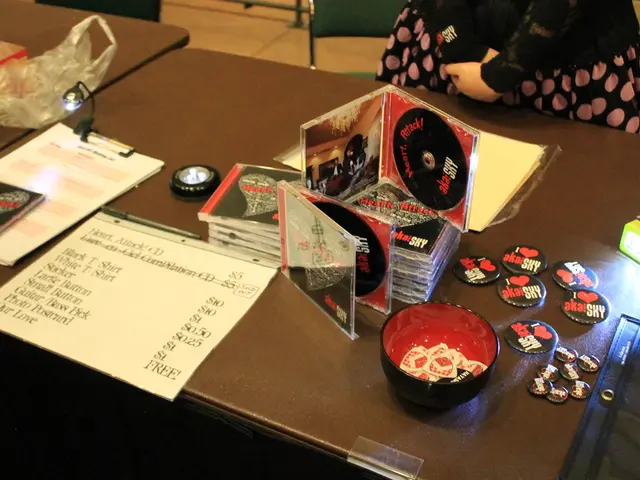Business Leaders in Thailand Unveil Strategies for Survival in the Face of Potential Economic Contraction Due to Trump's Tariffs
In the face of increasing US tariffs on exports, Thai businesses are implementing a variety of strategies to weather the economic storm.
Financial institutions in Thailand are strengthening their internal resilience with robust operational frameworks and adequate provisions to support affected clients. Siam Commercial Bank (SCB), for instance, is pursuing growth in large-scale lending, wealth management, and fee-based services, targeting 25% digital revenue with an 80:20 project management principle. Smaller banks, such as Thai Credit Bank, are implementing defensive measures to weather anticipated economic turbulence from US tariff policies. The CEO of Thai Credit Bank, Roy Augustinus Gunara, has outlined a two-pronged strategy for the bank, focusing on supporting customers during crisis periods and maintaining institutional strength through robust financial and operational frameworks.
The aviation industry in Thailand is pivoting to a Network Strategy. Thai Airways is focusing on a "Network Strategy" that leverages airline partnerships to create multiple revenue streams from connecting flights. Thai Airways is also seeking to reduce its reliance on domestic tourism, while the airline executive of Nok Air, Wutthiphum Jurangkool, remains optimistic about high-demand markets including India, Vietnam, and China.
Thai business leaders are bracing for economic turbulence as new US tariff policies threaten to disrupt the kingdom's export-driven economy, which relies on foreign revenue for more than 50% of its GDP. However, the Thai Hotels Association President, Thienprasit Chaiyapatranun, has noted that Thailand's tourism sector hasn't experienced direct impact from US retaliatory tariffs, but uncertainty remains over future energy costs as Thailand imports some oil from the United States.
To mitigate the impact, the Thai government has negotiated a reduction of US tariffs from 36% to 19% and is preparing a tailored compensation package for affected sectors, including entrepreneurs, exporters, and farmers. Businesses in vulnerable industries such as electronics, processed foods, and electrical appliances are expected to adopt differentiated approaches: some may absorb part of the tariff costs while others pass it on to US buyers.
Thai business leaders and bankers emphasize diversification of trade partners by pursuing new free trade agreements with the EU and Canada to reduce dependence on US markets. Analysts call for clearer domestic content rules to protect Thai producers under US trade conditions and mitigate the impact of increased US imports of agricultural products.
Companies are improving operational efficiency and strengthening strategic partnerships to maintain resilience amid global trade uncertainty. The banking sector is focused on prudent risk management, cost reduction, and expanding digital and fee-based services to support businesses through the slowdown.
HSBC Thailand CEO Giorgio Gamba has emphasized the bank's role as a "super-connector," leveraging its presence across 20 countries to help clients diversify risks and create enhanced investment opportunities. The CEO of Land and Houses Bank, Shih Jing-Fuh, has stated that only 10% of the bank's portfolio faces direct impact from trade wars, with the bank continuing to provide financial assistance and debt restructuring for affected clients.
Thailand's business leaders are expressing confidence in their preparedness for the new economic reality, emphasizing diversification, operational efficiency, and strategic partnerships as key survival tools in an increasingly uncertain global trade environment.
- The Thai Hotels Association President has mentioned that Thailand's tourism sector, despite relying heavily on foreign revenue, hasn't experienced a direct impact from US retaliatory tariffs, but there's uncertainty regarding future energy costs due to oil imports from the United States.
- Siam Commercial Bank (SCB) is focusing on growth in large-scale lending, wealth management, and fee-based services, targeting 25% digital revenue with an 80:20 project management principle.
- Smaller banks, such as Thai Credit Bank, are implementing defensive measures to weather anticipated economic turbulence from US tariff policies, with their CEO, Roy Augustinus Gunara, outlining a strategy focusing on supporting customers during crisis periods and maintaining institutional strength through robust financial and operational frameworks.
- Thai Airways is adapting a "Network Strategy" that capitalizes on airline partnerships to generate multiple revenue streams from connecting flights, while aiming to reduce its reliance on domestic tourism.
- The CEO of Land and Houses Bank has stated that only 10% of the bank's portfolio faces direct impact from trade wars, with the bank continuing to provide financial assistance and debt restructuring for affected clients.








